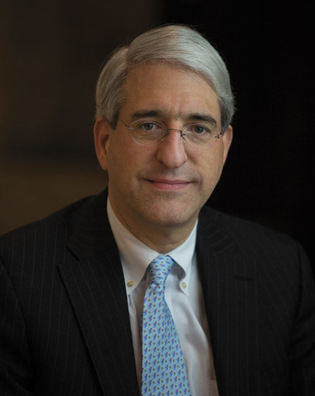 loading
loading
Q&A: Peter SaloveyOn leadership—and the humanitiesWhich is more important: to be responsive or to be responsible? The Yale Alumni Magazine regularly holds a conversation with Yale president Peter Salovey ’86PhD to provide a forum in which alumni can learn his views. (Interviews are conducted both in person and by e-mail and condensed for print.)  Mark OstowIn this issue, Salovey talks about the nature of leadership. View full imageY: You were recently at the World Economic Forum at Davos, where the theme was Responsive and Responsible Leadership. Many talks were given and many points of view aired. But what does “responsive and responsible leadership” mean to you? S: First, let me say that we go to Davos every year—the president and several professors. What we’re trying to do there is promote the research and scholarship of Yale faculty, meet with members of our alumni community, and contribute to the thinking of the attendees. This year we promoted a theme that we believe is important to creating responsive and responsible leadership: liberal education, especially the study of the humanities. The first task of a responsive and responsible leader is to recognize that many issues are not bipolar—not black and white. And it’s through the humanities that you develop an appreciation for complexity. They also help one learn to be a responsive leader, because through the humanities we can learn to understand each other. Great literature, for example, helps us understand people’s motives and why people behave as they do, and how it is that a situation can evolve over time. Whether you’re a leader in the sciences, technology, government service, finance, business—having a deeper appreciation of other people because you have studied the humanities is a great complement to your main area of study.
Y: How can one execute responsive leadership when there’s no clear mandate and constituents are divided, as has sometimes been the case at Yale recently? S: This question reminds me that what dominated conversation at Davos this year was the rise of populist movements throughout the world. People in Davos were wringing their hands over how they, and leaders in every domain, had missed what was coming—had missed the fact that people were feeling left behind by technology, alienated, disconnected from their leaders. Responsive leadership involves not only talking to people like ourselves, but also having a particular sensitivity to people who are not like ourselves. For me, in any campus controversy, it means, first, listening to people with different perspectives; then considering first principles; then making decisions. To make good decisions, especially when constituencies are divided, we must ask, what are the first principles here? What are we trying to achieve, and what is the right thing to do? A great example is the academic priority question we discussed in the last issue of the Yale Alumni Magazine. Our priorities include investments in five areas: the sciences, the humanities, the arts, the social sciences, and overall faculty excellence. Of those, the most costly decisions we’re going to have to make are in the sciences, and those will be difficult choices. So what’s the first principle? We have a faculty committee now meeting to discuss that. My guess is that they will generate a principle such as: what is the kind of science that could potentially, now or in the future, have the greatest impact on improving the world—on saving lives and saving our planet? Then they may get to more local principles: what are the areas where Yale University can excel and has an opportunity to have outsized impact? Those principles will help us decide where to invest. Of course, we are also seeking to make the pie bigger through the generosity of donors and paring back where we can.
Y: How does a leader balance being “responsive” with being “responsible”? S: You might think that being responsible means to make a decision based on your own best judgment, and that you can do that without being responsive to those you lead. But it’s actually very important that, before the decision is made, a leader hears those voices that might be calling for a kind of outcome he or she hasn’t thought of. On the other hand, you can be so responsive that you don’t make the best decision, because of a concern about trying to satisfy incompatible constituent groups. So I think you have to be both. In some ways, responsibility is at the core of leadership. Irresponsible leadership can cause great, great harm. Now, unresponsive leadership might not cause great harm—but it might not lead to the best possible answer. And it might not lead constituents to embrace the decision and follow it. Both are bad outcomes. At the end of the day, if we understand each other, we can maintain our responsibilities but have a far better chance at being responsive. And as a result, we can be more effective leaders. This is one reason Yale believes so strongly in liberal education.
The comment period has expired.
|
|